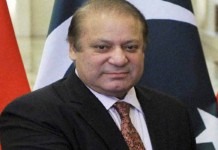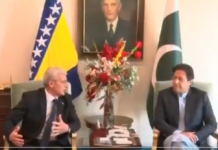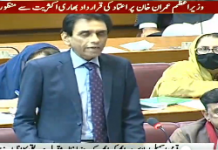مضمون کا ماخذ : لاٹری کا حساب
Govt challenges SC verdict on army chief’s extension
The federal government on Thursday filed a review petition against the Supreme Court’s verdict in the army chief’s extension case. In the petition, the government pleaded the court to form a larger bench to hear the case, and requested it to keep the proceedings in-camera. The petition argues that the apex court verdict did not […]
The federal government on Thursday filed a review petition against the Supreme Court’s verdict in the army chief’s extension case.
In the petition, the government pleaded the court to form a larger bench to hear the case, and requested it to keep the proceedings in-camera.
The petition argues that the apex court verdict did not take into account important constitutional and legal points. It further states that the apex court has itself ‘been giving extensions to additional and ad-hoc judges’, making a case for the government to exercise this discretion as well. Furthermore, the petition argues that the court did not base its decision on the judgement in the judges extension case.
The review appeal listed the federal government, Prime Minister Imran Khan, President Arif Alvi and Chief of Army Staff Gen Qamar Javed Bajwa as petitioners.
The petition, submitted by Attorney General Anwar Mansoor, questions the legal aspects of the judgement. 220;The impugned judgment is bad in law and facts. The same is completely without jurisdiction, void ab initio and of no legal effect,” reads the petition submitted against the verdict. It further says that the order ‘suffers from material irregularities’ which have ‘converted the process from being one in aid of justice to a process of injustice’. It also claims that the court has ‘completely overlooked’ the laws laid out in the constitution as well as ‘vital laws’.
The petition says that the court should not have interfered on the grounds of public policy and collective conscience. “It is respectfully pointed out that glaring omissions and patent mistakes have crept into the impugned judgment, violating the law and the constitution. The nature of the controversy at hand was really the rarest of the rarest cases in which honourable court should not have interfered on the grounds of public policy and collective conscience. In fact, the honourable court had no role to upset the age-long accepted conventions and the considered policy of the government,” says the petition.
The petition notes that the court said that chosen representatives should decide matters pertaining to appointment and extension of the army chief and that people can ‘accept or reject’ the decision taken through their chosen representatives. “With due respect this means that the appointment has to be made through the chosen representatives, who have left the matter to be dealt by conventions by not legislating for seven decades and there is nothing wrong with this.”
The petitioner ‘with the highest respect’ insisted that the judgement by the top court is ‘patently erroneous’ and that the errors are ‘floating on the face of the record’.
The appeal says that the Supreme Court had ‘fundamentally failed to note’ that the terms and conditions, service rights and tenure of a sitting official ‘can be regulated by departmental instructions, office memoranda, conventions, customs, usages and other executive instructions, provided they are not in violation of any statutory provisions’. “In the present case, the appointment of the COAS was strictly in accordance with the settled departmental practice followed for seven decades or so,” it said.
220;The enemies of Pakistan were extremely happy when they thought that General Bajwa’s extension or re-appointment had fallen into jeopardy,” reads the review petition. “Pakistan is undergoing a 5th generation war.”
“Very recently, the Pulwama incident bears testimony to the preparedness of our Armed Forces under the able captaincy of General Bajwa, who on his proactive initiative has also mustered healthy military international relations and support for Pakistan,” it said. 220;The war on terror is not over. The wounds from the APS incident are not forgotten,” the petition reflected. 220;The preservation of two leading institutions of the state i.e. the Armed Forces and the Superior Judiciary are necessary concomitants to a healthy democracy, rule of law and safety and security against internal and external aggression.”
220;The enemies of the state, now for a number of years have ganged up to destabilise and discreate Pakistan,” it read. “General Bajwa’s contribution to take vital steps so as to facilitate safety and security in the country, will go down in history. The pulse of the people at large is that General Bajwa’s re-appointment has been warmly welcomed. There were seminars and processions in favour of General Bajwa’s re-appointment, from which the pulse of the public opinion can be appreciated,” said the petition. “In the present times, it was most appropriate to re-appoint General Bajwa, who himself never sought a re-appointment.”













